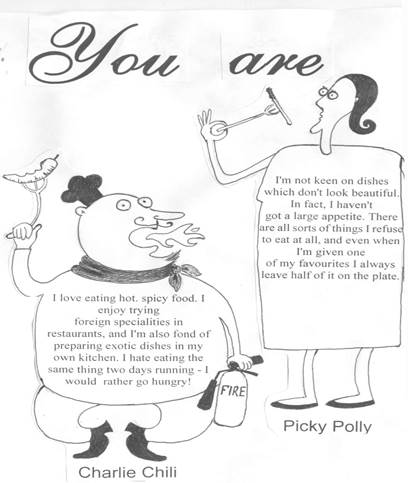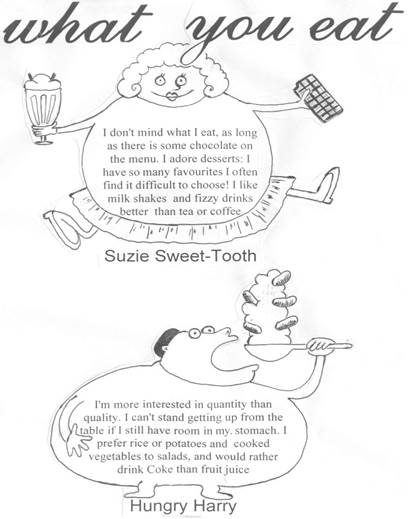Look through the opinions of three persons and describe your eating habits in the same way.
Раздел 3
РАЗГОВОРНАЯ ТЕМА
“FOOD AND HEALTH”
Warming-up.
Some people care about their health, others don’t: they have bad health and eating habits. What good and bad habits can people have concerning their health? What are your friend’s health and eating habits? Define good and bad health and eating habits from the list below:
eating fast food and junk food,
sleeping too much or too little
buying tinned and frozen food
skipping breakfast
eating between meals
going in for sport
smoking and drinking beer, alcohol
eating sandwiches to save time
being a hearty-eater
eating different kinds of food
avoiding fatty food
eating fresh fruit and vegetables
Look through the opinions of three persons and describe your eating habits in the same way.
Steve:I know this kind of food isn't very healthy, but I like it. Anyway, I'm young, so it doesn't matter really. I suppose I eat sandwiches to save time. And round here, if you go to a restaurant it costs a lot. I'm not used to eating a lot actually; I don't seem to get very hungry.
Paul: I eat anything, really, it just depends how hungry I am, and where I am at the time. I mean, sometimes I don't have any breakfast so I need something filling for lunch. But I don't always have large meals, some days I just have a snack, you know, a bar of chocolate or something.
Jane: I like eating different kinds of food, Chinese, Indian, Italian, all kinds. I think that food is important if you want to stay healthy. I try to avoid fatty food, and make sure that I eat fresh fruit and vegetables. I don't think that good food costs more.
3. Before reading the text “Food Glorious Food”, try to answer the questions truthfully. Do the tasks after the text.
Do you eat the same thing every day?
Do you eat your meals in a hurry?
Do you eat lots of fast food?
Are you addicted to sweets and chocolate?
If you answered YES to any of those questions, then it's time to pay more attention to what you eat and how it affects you.
If you eat junk food day after day – like hamburgers and pizzas – you won't feel satisfied and you won't be healthy. Our nose and mouth are extremely sensitive to the flavour, the smell and even the temperature of the food we eat. We need to stimulate all these senses by eating a wide variety of really tasty foods. So, start experimenting! Instead of your usual boring junk food, why don't you try a crisp mixed salad, with a blue cheese dressing? Or a spicy vegetable soup with fresh bread? Whatever you choose, the important thing is to try something different and give your taste buds a treat.
Always make time to sit down and eat your meals at the table. Even the way you chew your food is important. Your mouth has lots of nerve endings that send a message to your brain. If you eat your food too fast, your brain misses the signal, so it doesn't realise that you've eaten anything. As a result, you'll want to carry on eating.
Cut out sugary snacks like biscuits, sweets and cake – they're bad for your mind and your body! Your body absorbs sugar very quickly, so eating sugary foods can give you an immediate sense of energy and well-being. But it doesn’t last long, unfortunately. So why eat foods that will make you feel high and then low? Just give them up! Instead, have a piece of fresh fruit when you need to increase your energy level quickly. You'll feel much better. Protein-rich foods are satisfying and nutritious and can give you the same 'happy' feeling as sugar.
Take more exercises! When you start exercising, you'll need to eat the light food at the right time to help you feel well.
When you exercise, you need to be wide awake and alert. The best plan is to eat lots of protein along with fibre-rich, vegetables or salad. And when you've finished your work and exercises, eat carbohydrates to get back the energy which your body used up during exercise.
1. What advice about eating habits do you think the article gives?
2. Make up a dialogue with your group-mate based on the information in the text.
4. Inside these humorous pictures there is quite serious information. Could you give character analysis of each person? What is your favourite in each of the following categories? What do you like least? Use a prompting frame in your talk.
| CHARACTER ANALYSIS Chilli eaters are brave and adventurous; they like to shock, but they get bored and restless very easily. Sweet eaters are easy-going and sociable but they lack confidence. They are kind and sympathetic but not always reliable. Hungry eaters are hard-working and generous; they aren't ambitious and hate changes of any sort. They worry about the future. Picky eaters are artistic and sensitive but they lose their tempers easily. They set themselves very high standards and don't like to fail. |


5. Translate the title of the exercise and do the tasks.
“Foods for Health and Food for Thought”
a) Write “balanced” or “unbalanced” beside each meal and answer the questions.
Chicken, carrots, rice, and a salad______________
Fried fish, a glass of milk, and eggs_____________
Lettuce, onions, fish, and noodles______________
Potato chips, chocolate, and candy______________
Tomato, and onion______________
Questions:
What are some healthy foods?
What is junk food?
What are some junk foods?
What junk food can you cook?
What is your favorite food?
6. Use the questions after the text “Eating Fish is Good for the Brain” and work in pairs.
Eating fish every week may keep our brain more active during our older years. This is the conclusion of research conducted by the Rush University Medical Center in Chicago. The study found that older people who eat fish regularly have quicker and better memories. Over a lifetime of eating fish, people could be three to four years mentally younger in age. Lead researcher Martha Clare Morris said: "We found that people who ate one fish meal a week had a 10 % slower annual decline in thinking....People who rarely eat fish have a...faster decline in their thinking ability over time."
Morris's team collected information on the diets and memory loss of 6,158 people aged 65 and older. She concluded: "Eating fish may help to slow people's decline in thinking ability as they age." She thinks several fatty acids contained in fish may help the brain's development. Eating fish has previously been associated with a lower risk of developing Alzheimer's disease or having a stroke. Oily fish, like salmon and tuna, is a rich source of omega-3 acids which are healthy for our body.